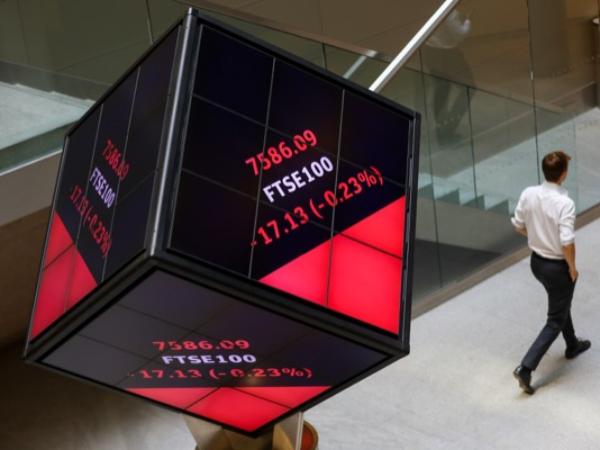Could Monkeypox cause a FTSE 100 crash?
The FTSE 100 is up 0.4% to 7,533 points year-to-date, comparing favourably to the S&P 500’s 12.9% decline, and the 22.2% fall of the Nasdaq Composite.
 Source: Bloomberg
Source: Bloomberg
Apocalyptic economic warnings are currently as common as a Union flag. JP Morgan CEO Jamie Dimon has predicted an economic ‘hurricane is right out the down the road coming our way.’
Guggenheim CIO Scott Minerd has warned of a ‘summer of pain’ for the stock market. Opinion ranging from Jeremy Grantham to Michael Burry is that equities remain in trouble.
FTSE 100 futures: defensive stocks
Fortunately for the FTSE 100, oil majors BP and Shell are profiting from the rising price of Brent Crude. Likewise, the big four banks —HSBC, Barclays, Lloyds and NatWest — are seeing profit spikes with every base rate increase. With CPI inflation at 9% and rising, many more could be on the way.
And with the index outperforming almost every other international index, 2022 could be its year to shine.
One key risk for the FTSE 100 would be a resurgence of the covid-19 pandemic in the form of a new variant. This would almost certainly see central banks turn the quantitative easing taps back on, which in the past has benefitted international peers far more.
It’s worth noting that the S&P 500 took a mere five months to recover from its initial pandemic-induced crash, and then soared far higher. Meanwhile, the FTSE 100 took almost two years and has stayed largely flat since.
However, a pandemic resurgence appears unlikely for now, as Western populations are both highly vaccinated and have acquired a strong degree of natural immunity. But a similar effect could be felt if the Monkeypox virus becomes widespread. Fears of global disease outbreaks are and will remain, heightened for some time to come.
But it’s hard not to draw parallels between the World Health Organisation’s (WHO) first covid-19 disease outbreak media release on 5 January 2020. The medical body noted that while 44 cases had been discovered, there was ‘no evidence of significant human-to-human transmission and no health care worker infections have been reported.’
Less than three months later, the markets were in free fall and the UK was in lockdown.
 Source: Bloomberg
Source: Bloomberg
FTSE 100: Monkeypox concerns
On 7 May, the UK Health Security Agency (UKHSA) confirmed the first UK Monkeypox case, noting it is ‘usually a mild self-limiting illness and most people recover within a few weeks… there is a very low risk of transmission to the general population.’
However, there are now 190 UK cases. For perspective, 82 of these were reported in the last week alone. And with crowds of thousands celebrating the Jubilee, the chance of the infection spreading is increasing.
WHO European emergencies team member Dr Catherine Smallwood has warned ‘we're clearly seeing quite rapid ongoing spread…it's been so widely distributed, cases are not linked together and we don't have a single chain of transmission.’
Initial symptoms are very similar to flu before infectious lesions eventually develop, which can spread the disease through sustained skin-to-skin contact.
Worryingly, WHO emergencies director Dr Mike Ryan thinks that the ‘ability to amplify the disease and move it on within our communities is increasing’ for zoonotic viruses like covid-19 and Monkeypox.
Meanwhile, WHO Monkeypox technical lead Dr Rosamund Lewis has warned that ‘we don’t really know whether it’s too late to contain. What WHO and all member states are trying to do is prevent onward spread.’ The organisation says there are now 550 cases across 30 countries.
However, even in the unlikely event that Monkeypox developed into a full-blown pandemic, it would be a very different story to covid-19. The virus’s similarity to the now eradicated Smallpox means that several effective vaccines already exist.
In the UK, Imvanex is already being offered to close contacts. The US is releasing stocks of its Jynneos vaccine as cases have spread across nine states. And while Lewis notes that collective immunity to Monkeypox is low as smallpox vaccination programmes have ended, on-alert governments are far better prepared for a worst-case medical scenario than in 2020.
Some perspective is also important. For every world-changing covid-19, there’s been dozens of scare stories that came to nothing. Moreover, the risk to the general population remains very low for now.
Of course, FTSE 100 investors heard similar sentiments in January 2020.
Trade what you want, when you want with the UK’s No.1 trading provider.* We have over 80 top global indices with more trading hours than anyone else. Find out more about indices trading or open an account to trade now.
*Based on revenue excluding FX (published financial statements, June 2020).







0 Comments
Recommended Comments
There are no comments to display.
Create an account or sign in to comment
You need to be a member in order to leave a comment
Create an account
Sign up for a new account in our community. It's easy!
Register a new accountSign in
Already have an account? Sign in here.
Sign In Now